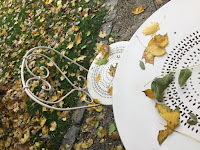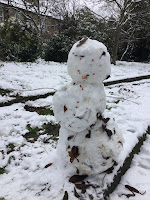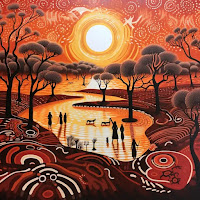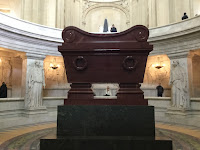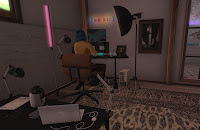For those of you who qualitative researchers:
- Firstly, videos showing how generative AI can be used in qualitative analysis are included in the series Research with Dr Kriukow https://www.youtube.com/@QualitativeResearcher/videos [NB this account was hacked on 5th Jan 24 so may be unavailable - see https://drkriukow.com/]
- Secondly, from the expert in online interviews, Dr Janet Salmons, is the video Technology, Communication and E Interview Structures https://youtu.be/9ThgRc7QZ78?feature=shared again part of a Youtube channel on qualitative research https://www.youtube.com/@jesalmons/videos
- Finally, a 20 minute video Trustworthiness (Rigour) Criteria in Qualitative Research
from Dr Yazdan Mansourian https://youtu.be/vyN6sTa_n1o?feature=shared
Photo by Sheila Webber: Xmas wreath (not mine), December 2023
Curating information literacy stories from around the world since 2005 - - - Stories identified, chosen and written by humans!
Sunday, December 31, 2023
Videos about qualitative research
Saturday, December 30, 2023
Archipelago of Information Science
Dr Jenna Hartel has put a video series An Archipelago of Information Science on her Youtube channel. This series of short and imaginative videos "explores ideas on the frontier of Information Science. It enacts the metaphor of an island chain—an archipelago—of incipient concepts existing still somewhat offshore of the Information Science 'mainland.' " - it arose from the excellent keynote at ECIL that Pam McKinney blogged here in October.
This is the link to the playlist https://www.youtube.com/playlist?list=PLZp7Vke_WTVpFc-vT3Yv6he9iNFztRvAg and the introduction is embedded below.
There is also a souvenir map
Thursday, December 28, 2023
Exploring AI pedagogy
An interesting resource is Exploring AI pedagogy: A Community Collection of Teaching Reflections, which has summaries/reflections on teaching related to AI, posted by university lecturers
"Have you tried something in your classroom related to AI that excited or disappointed you? Is there a classroom activity that has made you hopeful about the future of AI in higher ed? Maybe you tried out a pedagogical practice that you heard about from a colleague and have some reflections to offer? On this site, you can share your pedagogical experiences with colleagues and reflect on successes, failures, and results that leave us perplexed."
A good source to dip into for ideas. Created by the MLA-CCCC (The Modern Language Association and Conference on College Composition and Communication) Joint Task Force on Writing and AI. The resource is at https://exploringaipedagogy.hcommons.org/ and it includes a google form you can use to submit your own intervention/ reflection.
Photo by Sheila Webber: house with wreath in London, December 2023
Wednesday, December 27, 2023
Webinar: Building Inclusive Online Tutorials
There is a free webinar on 7 February 2023 at 2pm US Eastern time (which is, e.g., 7pm UK time): Building Inclusive Online Tutorials, presented by Abigail Mann
"We will discuss content and structure choices that are possible in online tutorials to create inclusive, welcoming learning environments even without the benefits of personal interaction. Topics covered include diverse visual cues, multimodal approaches, and gender inclusive language."
It is part of the Carterette series of webinars, organised by the US Georgia Library Association.
Register at https://us06web.zoom.us/webinar/register/WN_tnRNakwQSdSursACqo_W8w
Photo by Sheila Webber: wreaths of South London, December 2023
Tuesday, December 26, 2023
Webinar: Information Literacy through Theory
Monday, December 25, 2023
Merry Christmas to all information literacy enthusiasts
Friday, December 22, 2023
Algorithm literacy
Augustinus, M. (2022). What do we talk about when we talk about algorithmic literacy? A scoping review. (Masters dissertation). University of Boras. https://www.diva-portal.org/smash/get/diva2:1732027/FULLTEXT01.pdf. A useful review.
Archambault, S.G. (2023). Toward a new framework for teaching algorithmic literacy. Information and Learning Sciences, (early online publication) https://doi.org/10.1108/ILS-07-2023-0090. This is not open access, so here is some more information:
"Eleven semistructured interviews and one focus group were conducted with scholars and teachers of critical algorithm studies and related fields. A content analysis was manually performed on the transcripts using a mixture of deductive and inductive coding. Data analysis was aided by the coding software program Dedoose (2021) to determine frequency totals for occurrences of a code across all participants along with how many times specific participants mentioned a code. Then, findings were organized around the three themes of knowledge components, coping behaviors and pedagogy.
Findings: The findings suggested a set of 10 knowledge components that would contribute to students’ algorithmic literacy along with seven behaviors that students could use to help them better cope with algorithmic systems. A set of five teaching strategies also surfaced to help improve students’ algorithmic literacy."
The knowledge components were: Bias causes (what causes bias); Black box (understanding how much of algorithms was hidden);common misconceptions; algorithm strengths; machine learning vs rule based; key algorithmic operations; human-algorithm interplay; algorithmic reasing vs human reasoning; commodification; infrastructure.
The coping behaviours were: Recognise across domains in everyday life; privacy of personal data; folk theories; gaming the system; broader advocacy (becoming an activist in raising issues); critical evaluation; scepticism anarchy.
The pedagogogic strategies were: tactile (buildingalgorithms); data transparency tools; speculative futuring; perspective taking; expectancy violation.
Image by Sheila Webber using Midjourney AI - using the prompt Sheila Webber. I don't look like that
Thursday, December 21, 2023
#LILAC24 bursaries
They prioritise: Individuals who have not previously attended a multi-day national/international conference; Individuals from groups underrepresented and/or marginalised in the library and information profession, including (but not limited to): LGBTQIA+, disabled and neurodivergent applicants, and applicants from BAME backgrounds; Student members; New professionals (less than 5 years' experience); Members who earn below £23,000 per annum or are unwaged.
Full info at https://www.cilip.org.uk/members/group_content_view.asp?group=201296&id=1020639.
Photo by Sheila Webber: inside the Rodin museum, November 2023
Wednesday, December 20, 2023
Webinar: Connectivity & Digital Disruption: The Digital Divide
On 21 December 2023 at 12 noon US EST (which is 17.00 UK time) there is a free webinar Connectivity & Digital Disruption: The Digital Divide.
"Susan Wiesinger and Ralph Beliveau discuss their new book, Digital Literacy: A Primer on Media, Identity, and the Evolution of Technology 2nd edition. This book, which is directed to young undergraduate students, seeks to inspire an attitude of inquiry toward media experiences. Central to such inquiry would be considerations of equal and unequal conditions as they proliferate across American culture, and then engage with global cultures. This discussion seeks to engage with the media literacy community to consider what can be done to reduce such inequalities while also recognizing and celebrating cultural differences. Breakout discussions will allow for closer attention to the way participants have experienced these divides locally."
The webinar includes time for discussion on: "What should the role of government be in reducing inequality? How are freedoms connected to access and education being effected by authoritarian tendencies? What can be done to encourage better and more equal experiences in the digital sphere?"
This is part of a series on inequalities and media education
Full details and registration at https://mediaeducationlab.com/events/connectivity-digital-disruption-digital-divide
Photo by Sheila Webber: shadows on the wall, December 2023
Tuesday, December 19, 2023
New articles: Health literacy in Bangladesh; Postgraduates' information literacy
Firstly, the first issue of open access Journal of Graduate Librarianship is at https://dc.etsu.edu/jgl/. I think that "graduate librarianship" is librarians who are providing services to postgraduate students - Masters or PhD students. The first issue includes
- A Two-Phase Study Examining Graduate Library Student Knowledge Gains and Perceptions of Information Literacy Modules by Holly S. Hebert, Karen V. Nourse, and Kevin S. Krahenbuhl
Secondly the latest issue of the open access IFLA Journal (Volume 49, No. 4 (December 2023) at https://repository.ifla.org/handle/123456789/3159 includes
- Community engagement of public libraries for ensuring tribal women’s
health literacy in Bangladesh
by
Shamima Yesmin, Md Abdul Karim and Md Atikuzzaman.
Abstract
"The main aim of this study is to
investigat epublic libraries’ responses and willingness in providing
health information services to tribal communities. Data was collected
from11 library professionals using a structured
interview method and 276 tribal women through a survey. The data was
then analysed using the Statistical Package for the Social Sciences (SPSS).The findings show that most of
the
participating libraries (72.8%) did not provide any specific service for tribal-community engagement, although
all of them were very positive in initiating it. On the other hand,
the majorityof the tribal women were interested in getting health-related
information from public libraries. ‘Community engagement fo rhealth
literacy’ could be a new formula for tribal communities in this regard."
Photo by Sheila Webber: autumn leaves in Paris, November 2023
Monday, December 18, 2023
Information literacy and society report
The UK's Media and Information Literacy Alliance (MILA, which is separate from UNESCO's MIL Alliance) has released a report, the Information literacy and society report, produced by a group of researchers at Edinburgh Napier University, Scotland, which was commissioned to review of research about the impact of Information Literacy on society.
"The review finds that the core research that investigates the role of IL in society is geographically skewed towards the anglosphere and the first world. Education, particularly tertiary education, is significantly over-represented in the IL research literature. Barriers to shaping information-literate populations are raised by issues around IL teaching and structures that could support it, including government (in)action."
The full report, including full references, can be found at https://mila.org.uk/wp-content/uploads/2023/11/ILS-final-project-report-AS-PUBLISHED.bmrV2_.pdf
Photo by Sheila Webber: in the gardens of the Musee Montmartre, November 2023
Friday, December 15, 2023
PIL climate study
Project Information Literacy has started a new project, focusing on information about climate change "a large-scale survey of U.S. residents between 16 and 85 years old to delve into how their encounters with climate change news and information — and the behaviors that manage those encounters — shape Americans’ disparate responses to the worldwide climate crisis." It started this autumn with a survey of 4500 members of the general public in the USA. There is more information here https://projectinfolit.org/faq-pil-climate-study/
Photo by Sheila Webber: snowman, December 2023Thursday, December 14, 2023
New book: Everyday Evidence-Based Practice
ACRL has published Everyday Evidence-Based Practice in Academic Libraries: Case Studies and Reflections, (eds. - Claire Walker Wiley, Amanda B. Click, and Meggan Houlihan). US $84.00, or $75.60 to ALA Members. Item Number: 978-0-8389-3985-7. It is in 5 parts, and part 3 is Instruction and Outreach, with 3 chapters:
- Everyday Evidence to Assess Teaching and Learning: A Programmatic Assessment of Library Instruction by Matthew Weirick Johnson, Michelle Brasseur, Monica Hagan, Diane Mizrachi, and Jimmy Zavala
- Incorporating a Lesson Study Approach to the Development of an Evidence Synthesis Workshop Series by Zahra Premji and K. Alix Hayden
- Out of Context: Incorporating Intersectionality in Information Literacy Instruction by Matthew Chase
Details of the book at https://www.alastore.ala.org/content/everyday-evidence-based-practice-academic-libraries-case-studies-and-reflections
Photo by Sheila Webber: Renoir gardens at the Musee de Montmartre, Paris, November 2023
Wednesday, December 13, 2023
Cat Park
Another game highlighting the problems of disinformation spread by social media is Cat Park. You play someone who (spoiler alert) is initially manipulated to spread propaganda to destroy a cat park and then (once the real plan behind this is revealed) you try and spread some facts to make things better. It is free for all to use at https://catpark.game/ and is professionally done (could be even more cats, though!). It works with Chrome (possibly not with Firefox).
I found out about this game from a an article in which the researchers found "that people who play Cat Park find misinformation significantly less reliable post-gameplay (d = 0.95, p < 0.001) compared to a control group, and are significantly less willing to share misinformation with people in their network (d = 0.54, p < 0.001)." However it didn't improve their confidence in identifying misinformation.
Neylan, J., Biddlestone, M., Roozenbeek, J. et al. (2023). How to “inoculate” against multimodal misinformation: A conceptual replication of Roozenbeek and van der Linden (2020). Scientific Reports, 13, article 18273. https://www.nature.com/articles/s41598-023-43885-2#Sec2
Image by Sheila Webber using Midjourney AI, with prompt cat park, pastel colours, park with cats, --ar 16:9 (not sure those are all cats!)
Tuesday, December 12, 2023
ACRL companion document: Instruction for Educators
I had missed The Companion Document to the ACRL Framework for Information Literacy for Higher Education: Instruction for Educators which was approved by ACRL in June 2023. It "provides links to standards used in teacher education and connects the standards to the ACRL Framework to make information literacy practical and relevant to teacher education students as they work on course assignments, prepare for careers as teachers, and for work in the classroom."
"The Companion Document addresses three roles that information literacy plays in teacher education: supporting teacher education students' classroom work in their teacher education program; preparing teachers for research skills needed in their career; and preparing teachers to support the information needs and practices of their students."
Go to https://acrl.libguides.com/ed
Photo by Sheila Webber: Eiffel Tower, November 2023
Monday, December 11, 2023
Global Education Monitoring report 2023
UNESCO has produced the Global Education Monitoring report (GEM) which "addresses the use of technology in education around the world through
the lenses of relevance, equity, scalability and sustainability." One of the background papers is on Media and Information Literacy, by Divina Frau-Meigs https://unesdoc.unesco.org/ark:/48223/pf0000386080.locale=en The page with links to the background papers is here https://www.unesco.org/gem-report/en/technology-background-papers
To pull out one finding from the main GEM report:"Technology offers an education lifeline for millions but excludes many more.
- „Accessible technology and universal design have opened up opportunities for learners with disabilities. About 87% of visually impaired adults indicated that accessible technology devices were replacing traditional assistive tools.„
- Radio, television and mobile phones fill in for traditional education among hard-to-reach populations. Almost 40 countries use radio instruction. In Mexico, a programme of televised lessons combined with in-class support increased secondary school enrolment by 21%.„
- Online learning stopped education from melting down during COVID-19 school closures. Distance learning had a potential reach of over 1 billion students; but it also failed to reach at least half a billion, or 31% of students worldwide – and 72% of the poorest.„
- The right to education is increasingly synonymous with the right to meaningful connectivity, yet access is unequal. Globally, only 40% of primary, 50% of lower secondary and 65% of upper secondary schools are connected to the internet; 85% of countries have policies to improve school or learner connectivity."
https://www.unesco.org/gem-report/en/technology
Photo by Sheila Webber: Antony Gormley statues at the Rodin Museum, November 2023
Sunday, December 10, 2023
Women's history 2023 advent calendar
The women's history 2023 advent calendar has "favourite new (and sometimes not so new) sites and resources of the year for women’s studies and womens history" https://calendar.myadvent.net/?id=nt1kee5497mdo9efkzij7kqyil69xnum
Friday, December 08, 2023
Cfp: 3rd International Conference on Information Literacy (ICIL-Africa 2024)
There is a call for papers for the 3rd International Conference on Information Literacy (ICIL-Africa 2024), a sister conference to the European Conference on Information Literacy (ECIL). It is organised by the North-West University (NWU), in collaboration with Bibliotheca Alexandrina and the University of Pretoria and will take place in the Bibliotheca Alexandrina in Egypt, on 14-17 October 2024.
The deadline for abstracts is 15 March 2024 and the theme for the conference is Information Literacy Revolution: Get Ready!
Submission types are: Individual papers and posters; PechaKucha; Doctoral forum; Panel discussions.
The proposed topics are: Artificial Intelligence and Information Professionals; AI and Library Operations: Improving Library Services; Information Literacy and Smart libraries; Information Literacy Robotic Process Automation; Data and AI Literacy; Information literacy and sustainability in libraries; Information literacy/ media literacy and the battle against disinformation (fake news, reliable/unreliable resources); Information literacy and emerging technologies trends emerging since COVID -19; Information literacy and new paradigms: digital literacy, digital competencies, digital skills, and digital thinking.
More information at https://bibalex.org/baifa/en/page/ICIL-Africa2024submissions
Photo by Sheila Webber: The Thinker, Rodin Museum, November 2023
Thursday, December 07, 2023
New secretary for Scottish CoP @Bruce_Research
Bruce Ryan, of Napier University, is becoming the new Secretary of the Scottish Information Literacy Community of Practice, so it's a good moment to highlight that this group is still active. They have brought together stakeholders and also interacted with the Scottish Executive in a more active way than has been possible with the UK Government. Activities include, for example, a forthcoming meeting in Scotland to disseminate the Bridge project.
Their website needs updating with the latest information (something I imagine Bruce will be able to help with!) but it still has very interesting material, including their inspirational Scottish Information Literacy Framework (an early lifelong framework).
Wednesday, December 06, 2023
New articles: Indigenous IL; Artists; Community representation; Clinical judgement in nursing; 1st gen students; Australian librarians; Toffler
The latest issue of open access journal Journal of Information Literacy contains the following articles and also some book reviews. Go to https://journals.cilip.org.uk/jil/issue/view/46
- Information as a relation: Defining Indigenous information literacy by Sandra Littletree, Nicola Andrews, Jessie Loyer
- Emerging artists in transition: What role does information play in negotiating success and failure? by Maud Cooper
- An information literacy lens on community representation for participatory budgeting in Brazil by Peter Cruickshank, Bruce Ryan
- Engaging with practice: Information literacy instruction as a part of developing reflective thinking and clinical judgement in nursing studies by Margrethe Bakstad Søvik, Kari Røykenes
- Insights on first-generation students’ development of social capital for the rigours of college-level research by Leslin H. Charles
- Artificial intelligence literacy in libraries: Experiences and critical impressions from a learning circle by Karolina Andersdotter
- Giving voice to regional Australian academic librarians: Perceptions of information literacy and information literacy instruction by Annette Goodwin, Waseem Afzal
- Information literacy: Did Alvin Toffler beat Paul Zurkowski to it? by Andrew Shenton
Image created by Sheila Webber with Midjourney AI - the prompt was the string of words in the subject line
Tuesday, December 05, 2023
#MILCLICKS in The Gambia
This short news item from UNESCO reports on a session they supported at the Gambia's Youth Connekt conference in October 2023, the session being on using media and information literacy to combat hate speech, misinformation, and disinformation. Go to https://www.unesco.org/en/articles/media-information-literacy-avenue-youth-combat-hate-speech-misinformation-disinformation
Monday, December 04, 2023
Information Literacy presentations
Presentations from the LOEX Fall Focus conference held in November 2023 have been posted. One focus was developing colleagiues research and practice (for example materials are given from a workshop on Cultivating Community with Future Colleagues: Reference and Instruction Skill Building) Another theme was the first year experience, including first-generation students (e.g. More Than One Shot: Collectively Scaffolding Information Literacy in the First-Year Seminar and they include a link to lesson plans at http://lib.uncw.edu/il-uni101) There are also materials from a workshop on Generative Discussions on Generative AI: Preparing Librarians to Teach about Artificial Intelligence.
Go to https://loexfallfocus.org/session-materials/
Photo by Sheila Webber: Napoleaon's tomb, Paris, November 2023
Sunday, December 03, 2023
Podcast: Let’s Talk About Media and Communication
In the latest podcast Mathias-Felipe de-Lima-Santos talks about Google News Initiative: A double-edged sword for journalism (arguing it could undermine independent journalism: this is the article they are talking about). This is the podcast's home page https://www.cogitatiopress.com/wp/topics/mac
Photo by Sheila Webber taken in Second Life - the podcaster, November 2023
Friday, December 01, 2023
Teaching and Learning with Digital Primary Sources
There is a new report from Choice and JSTOR about Teaching and Learning with Digital Primary Sources: Nine insights into awareness, literacy, and collaboration between librarians, faculty, and students. You have to give some details about your name, place of work etc. before you can get the free download. The report includes brief interviews with 5 librarians who support teaching or teach IL using primary sources.
You can download the report at https://www.choice360.org/research/teaching-and-learning-with-digital-primary-sources-nine-insights-into-awareness-literacy-and-collaboration-between-librarians-faculty-and-students/
You can also see the launch webinar (November 14, 2023) here: https://youtu.be/dqdbBmiptW0?feature=shared
Image by Sheila Webber using Midjourney AI using prompt ancient manuscripts, in museum cases, hyperreal









